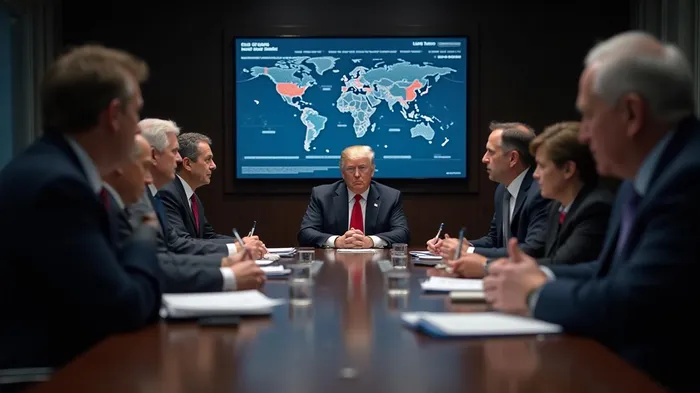Goldman Sachs Advises Nations on Navigating Trump Tariffs
Goldman Sachs has become a pivotal advisor for countries grappling with the complexities of U.S. tariffs under the Trump administration. Nations such as South Africa, Japan, and Saudi Arabia have sought the firm's expertise to navigate their relationships with the U.S. and mitigate the impact of potential tariffs.
South Africa, anticipating U.S. tariffs, sought guidance from Goldman SachsAAAU--. Since late February, South African leaders, including President Cyril Ramaphosa, have engaged in discussions with the firm regarding trade and improving relations with the U.S. One of Goldman Sachs' recommendations to the South African government was to consider modifying laws that mandate black ownership of certain companies and allow the government to seize property from landowners to address racial disparities. These laws, particularly the land expropriation law signed by Ramaphosa in January, have drawn criticism from figures like Elon Musk and President Trump, who described them as racist and a violation of human rights, respectively. However, Ramaphosa's spokesperson stated that the government would not support Goldman Sachs' suggestions, as they are committed to reforms aimed at correcting past imbalances from the apartheid era.
The trend of seeking advice from Wall Street banks is not limited to South Africa. Countries around the world are turning to these financial institutionsFISI-- for strategies to navigate the Trump administration's trade policies. Bankers advise that negotiations with the Trump administration may be influenced by issues unrelated to trade, potentially requiring political or symbolic concessions to the White House. Other nations, including France and Saudi Arabia, have also consulted with Goldman Sachs on their negotiations with the U.S. government.
Japan, for instance, has discussed with Goldman Sachs how to address Trump's accusations that its tax system subsidizes exports, disadvantaging U.S. manufacturers. However, Japanese officials have expressed skepticism about changing their tax policies solely to appease the Trump administration. Goldman Sachs, along with other major Wall Street banks, offers a range of services to corporate clients, from mergers and acquisitions to capital projects. They also regularly advise foreign governments, with these consultations becoming more frequent and urgent as Trump's policies have evolved.
The White House has made it clear that any trade partners seeking agreements with the U.S. must reduce tariffs and non-tariff barriers, which the administration blames for historical trade deficits. Since Trump took office, relations between South Africa and the U.S. have become strained, particularly due to South Africa's land expropriation laws, which the Trump administration views as an attempt to seize property from white landowners. This has led to the U.S. cutting financial aid to the South African government and promising support for white South African refugees fleeing alleged government-backed racial discrimination.
Following the U.S. expulsion of the South African ambassador in March, South African officials expressed concerns to Goldman Sachs about potential retaliatory tariffs. The firm noted that investors are dissatisfied with South Africa's asset purchase laws and the lack of support from the Trump administration for the land laws. In early April, Trump imposed a 31% retaliatory tariff on South Africa, listing it among the most egregious violators of fair trade practices. Trump later suspended these tariffs for 90 days, with bank executives privately informing clients that the suspension could be extended if negotiations show sufficient progress.
The Trump administration has indicated a preference for announcing multiple trade agreements simultaneously, rather than revealing them individually. U.S. officials are reportedly developing a template for tariff negotiations, with plans to engage in weekly talks with six countries before July. At a recent International Monetary Fund (IMF) meeting in Washington, trade negotiations were a focal point. During a closed-door session hosted by JPMorgan for over 500 investors, U.S. Treasury Secretary Steven Mnuchin predicted that negotiations with China would take two to three years and would not aim to decouple the two economies. JPMorgan CEO Jamie Dimon suggested that the best outcome of the trade war would be a mild recession in the U.S. economy.
During the IMF meeting, U.S. banks facilitated meetings between their clients and officials from the Trump administration's National Economic Council. One source familiar with the discussions revealed that Vietnam is negotiating with U.S. officials to reduce retaliatory tariffs from 46%. Japan has also engaged in talks with U.S. officials regarding its currency policies, which the Trump administration claims disadvantage U.S. companies.

Stay ahead with real-time Wall Street scoops.
Latest Articles
Stay ahead of the market.
Get curated U.S. market news, insights and key dates delivered to your inbox.

Comments
No comments yet